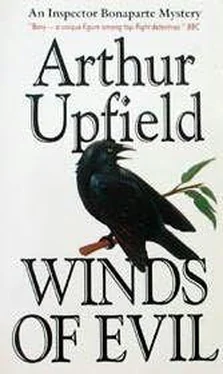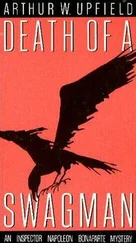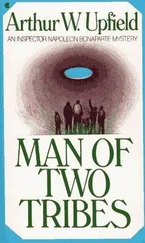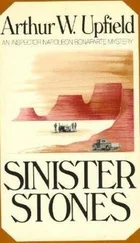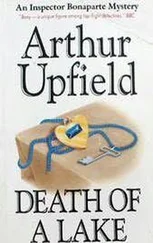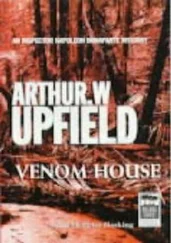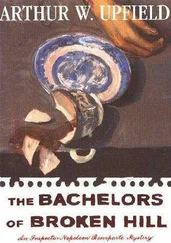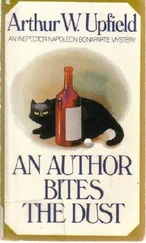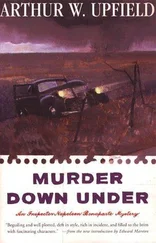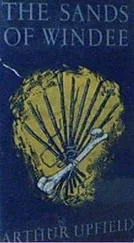Arthur Upfield - Winds of Evil
Здесь есть возможность читать онлайн «Arthur Upfield - Winds of Evil» весь текст электронной книги совершенно бесплатно (целиком полную версию без сокращений). В некоторых случаях можно слушать аудио, скачать через торрент в формате fb2 и присутствует краткое содержание. Жанр: Классический детектив, на английском языке. Описание произведения, (предисловие) а так же отзывы посетителей доступны на портале библиотеки ЛибКат.
- Название:Winds of Evil
- Автор:
- Жанр:
- Год:неизвестен
- ISBN:нет данных
- Рейтинг книги:4 / 5. Голосов: 1
-
Избранное:Добавить в избранное
- Отзывы:
-
Ваша оценка:
- 80
- 1
- 2
- 3
- 4
- 5
Winds of Evil: краткое содержание, описание и аннотация
Предлагаем к чтению аннотацию, описание, краткое содержание или предисловие (зависит от того, что написал сам автор книги «Winds of Evil»). Если вы не нашли необходимую информацию о книге — напишите в комментариях, мы постараемся отыскать её.
Winds of Evil — читать онлайн бесплатно полную книгу (весь текст) целиком
Ниже представлен текст книги, разбитый по страницам. Система сохранения места последней прочитанной страницы, позволяет с удобством читать онлайн бесплатно книгу «Winds of Evil», без необходимости каждый раз заново искать на чём Вы остановились. Поставьте закладку, и сможете в любой момент перейти на страницу, на которой закончили чтение.
Интервал:
Закладка:
Darkness arrived half an hour before due time, and Bony, who had most reluctantly decided to maintain an all-night vigil, slipped away from the homestead at five minutes to eight. He had prepared for a night’s absence from the men’s quarters with the story that Dr. Mulray and he were still fighting a game of chess and that they had determined to sit up till morning, if necessary, to finish it.
The night was not quiteso evil as that he had spent at Catfish Hole. The stars could be seen, if faintly, and the darkness was not absolute. The wind had dropped to a strong breeze, and, the temperature of the sand-particles being lowered by the going down of the sun, the wind had now no power to raise them off the ground.
With the cunning and the silence of his maternal ancestors, Bony moved without sound. Never a dead stick broke beneath his feet. He saw obstacles into which a white man would have blundered, over which a white man would have tripped, into which a white man would have plunged, with risk of broken bones.
On leaving the homestead he walked due north out on to the bluebush plain. Here he could not see the river trees, but he could see the weak spark of light which was the oil lamp suspended outside Nelson’s Hotel. The wind moaned and sighed dolefully about the bushes that appear so desirous of preserving their individuality by demanding plenty of space around them. Although Bony was forced to walk erratically to avoid them, he yet succeeded in keeping to a predetermined course.
Without once seeing either the river gums or the creek box-trees, he arrived at that solitary leopardwood-tree in which the crows had been quarrelling that afternoon he had tracked Donald Dreyton up into a box-tree. The Three Sisters and the Southern Cross announced the time to be a few minutes after nine o’clock.
Standing close to that side of the handsome, spotted trunk nearest the township, Bony made a cigarette, and then, with his coat removed and enveloping his head, he struck a match to light it. Thereafter he sat with his back to the tree, facing Carie, and smoked, confident that the west wind would not carry the scent of tobacco to the creek.
It was just such a night for which he had been waiting-a night when the aborigines’bunyip could be expected to walk, or swing along from tree to tree. Notwithstanding, Bony felt nervous and could not banish his nervousness. Here he sat trying to calm his nerves with cigarette-smoke, wearing a dark cloth coat with the collar turned up and pinned at his throat so that no portion of his white working shirt would be visible. In the right-hand pocket of the coat lay an automatic pistol of small calibre, and in the other was a reliable electric torch.
Who was this strangling beast who behaved like a monkey in trees, who killed with no motive save to gratify a lust to kill? Was his name on the list of persons supplied by Constable Lee? Was he a man, or was he, after all, the bushbunyip? Bony’s aboriginal blood tingled, and Bony’s white man’s mind fought to still the tingling. After a moment’s struggle the mind conquered the blood.
At this point of the investigation he was presented with several pertinent questions for which he could not supply the answers. He was decided that as the three crimes had been committed south of Carie the criminal must live in the township, or at Wirragatta or Storrie’s selection, and of the list of Lee’s names he had struck off all but eleven. These eleven men were “possibles”, but no one of them was a “probable” save, perhaps, Hang-dog Jack. They were:
HANG-DOG JACK, the cook
DONALD DREYTON, the book-keeper fence-rider
BILL THE COBBLER, station-hand
HARRY WEST, station-hand
FRED STORRIE, the selector
TOM STORRIE, the selector’s son
MARTIN BORRADALE, the boss of Wirragatta
CONSTABLE LEE
WEAVER, the storekeeper
JAMES SPINKS, the barman
DOGGER SMITH, the trapper
One of these men was the murderer of Alice Tindall and Frank Marsh, and the attacker of Mabel Storrie. They all had pre-knowledge of the movements of each of the three victims. There were names on the list struck off because, although the owners had pre-knowledge of the movements of one victim, it was proved that they had not this knowledge of the movements of the other. One of the eleven “possibles” was the murderer.
That the man who swung himself from tree to tree along certain sections of Nogga Creek was the person he called the Strangler, Bony was reasonably sure. The obvious reason for this singular method of locomotion appeared to be the desire to leave behind him as few tracks as possible. Yet in this case the obvious might not be the correct basis for argument. The assumption that the crimes were premeditated might be wrong. They might have been begotten by Impulse allied with Chance.
More than a third of the names remaining on his list he could with excuse have rubbed out, but, although the law assumes a man to be innocent until proved guilty, it is the detective’s duty to regard all suspects as guilty until investigation proves which of them are innocent.
Bony had not yet met Dogger Smith. Lee was a “possible”, because he admitted he knew that Alice Tindall was visiting the Wirragatta homestead the night she was killed. And, of course, he knew when Marsh and Mabel Storrie were in the town.
Of only one thing was Bony absolutely sure. The Strangler was no ordinary criminal. He had made only one mistake, which was the repetition of his crimes. This proved that his motive was the primal one, the lust to kill. He belonged to the terrible class of maniacs who can successfully conceal their mania from those about them-by far the most dangerous units of human society.
Perhaps it is no wonder that this half-caste Australian was fearful.
The cigarette having been consumed, he pushed the glowing stub into the soft, deep sand on which he was sitting, rose and stepped from the friendly tree, mentally girding his loins. Two minutes later he reached the creek track to the Broken Hill road, crossed it whilst his skin prickled and came direct to that tree into which Dreyton had climbed to retrieve the piece of grey flannel. It was the end one of fourteen trees forming one of the sections along which the “bunyip” progressed from branch to branch.
At the foot of this tree Bony determined to spend the night. He sat down with his back against its trunk, facing the north and the township, now masked from him by the intervening bluebush. No one could pass along the creek track without being observed. The circumference of the trunk at his shoulders was about five feet, and the knowledge was comforting that even a gorilla could not attack him from its far side and throttle him. Because of his dark clothes and skin, no one could see him from the branches this black, humid and sinister night. Yet, to him, anyone up among the branches would be silhouetted against the sky.
When he had taken up this position, Bony’s nerves became less taut. He felt much less vulnerable to attack than he had done when walking to and from the leopardwood-tree. He was not a powerful man-noteven a very robust one-and he knew that he would be no match for a man who could strangle with his hands a young fellow like Frank Marsh.
It says much for Bony that he essayed this vigil. The fears and inhibitions of his mother’s people were in his blood, and like all clever men his imaginative power was much too strong for this kind of work. Reasoning is for daylight, when the primal man in each of us can be, and is, forced back into the mists of time. Like many a white man who knows his bush, Bony believed in the bush spirit named by the blacks as “bunyip”, the spirit that gloats over the unfortunate who, alone, meets with accident, the spirit which lurks close by to a dry waterhole and watches the arrival of men without water. It is everywhere, thebunyip. It watches from the heart of every bush, from behind every tree-trunk, from the summit of everysandhill and from the foot of every mirage.
Читать дальшеИнтервал:
Закладка:
Похожие книги на «Winds of Evil»
Представляем Вашему вниманию похожие книги на «Winds of Evil» списком для выбора. Мы отобрали схожую по названию и смыслу литературу в надежде предоставить читателям больше вариантов отыскать новые, интересные, ещё непрочитанные произведения.
Обсуждение, отзывы о книге «Winds of Evil» и просто собственные мнения читателей. Оставьте ваши комментарии, напишите, что Вы думаете о произведении, его смысле или главных героях. Укажите что конкретно понравилось, а что нет, и почему Вы так считаете.
